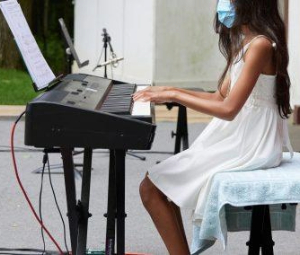- Why January Is the Perfect Time to Start Music Lessons in Downingtown PA
- How to Set Up the Perfect At-Home Studio for Virtual Music Lessons
- Online vs. In‑Person Music Lessons in Downingtown: Which Works Best for You?
- Faith and Music in Lessons at Downingtown Music Academy
- Why It’s Never Too Late to Return to Music Lessons: Stories, Tips, and Inspiration
- How Themed Practice Incentives Make Music Lessons More Fun and Effective
- Why Music is So Important for Neurodiverse Children
Should I Learn Piano?

Perhaps you’ve been wanting to take lessons but wondering “Should I learn the piano?” Let’s go over some of the pros and cons of taking piano lessons so that you can make the best decision for your wallet, your schedule and your personality:
Pros:
- easy to play for young students developing fine motor skills
- straightforward for music reading
- has benefits for both sides of the brain
Cons:
- May be a little more costly and take up space
- not very portable (depending on whether you get a keyboard or piano and the size)
- nails must be kept short
- Have to read two staves at once.
A Great Instrument for a Beginner and for your brain!
Beginning students will enjoy the piano for a variety of reasons. They won’t have to take a tremendous amount of finger strength to press down the keys. Students will find it relatively intuitive to read the music. As the notes go up on the page, the pianist plays the next finger to the right. As the notes go down on the page, the pianist plays the next finger to the left.
Reading and Motor Challenges
Sometimes students can find reading tricky because they have to learn two different staves (a lines and spaces configuration that organize music notes) at once. Students need to be adept at using two hands at once. Sometimes each hand has to play two very different patterns at the same time. However, these situations are only introduced after the student has developed some mastery of hands separately. Furthermore, developing this multitasking skill has tremendous benefits for the student’s brain. Studies have shown significant brain growth on both sides of the brain after years of studying piano when compared with non-musicians and with musicians that predominantly use one hand to plunk out notes and chords, such as violinists.
What’s the Cost?
A prospective pianist must also consider the cost and upkeep of a piano, and the space it takes up. If you have smaller living space, having a piano can definitely be a challenge. Getting a keyboard might be your best bet.
While the piano itself will likely be free if it’s being rehomed, you will need to consider for moving and tuning costs. Pianos must be tuned at least once a year. (side note: never take a piano from a previous owner if it has been living in a basement or garage or hasn’t been tuned in five years or more-it may be irreparable). You will need to place the piano in a room that doesn’t have variable humidity levels and it ideally should sit against an internal wall. If that’s a challenge, you might want to consider a keyboard or another instrument.
Before You Play, Put the Claws Away
Finally, if you’re a girly-girl who likes to have long manicured nails, the piano (and string instruments) may not be for you. You will need to keep your nails short to play with control and develop the correct technique. You need to be able to press the keys with the pads of your fingers. Long nails will not allow you to do this. So, keep the fun nail colors, but ditch the acrylics or trendy coffin nails.